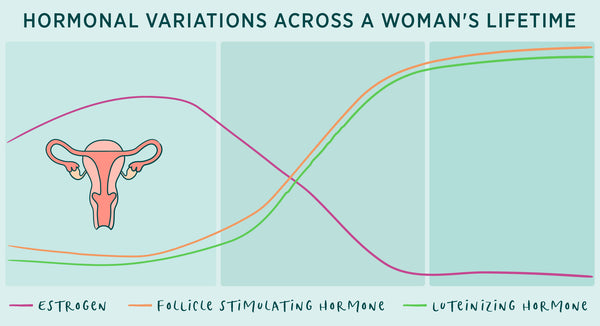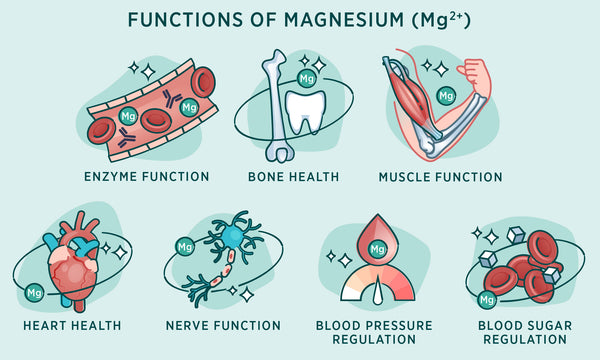You passed puberty, your turbulent twenties, and your tentative thirties. Forty came and you surmounted that proverbial hill. Fifty? Bring it on.
Life is a journey in every way. Up, down, and all around, but onward you go. For the first few decades of adulthood, your body generally stays the course. Twenty-five and thirty-five feel about the same. The dawn of mid-life still bears the shine of youth. But at some point in your prime of life, menopause casts a new tone.
What is Menopause?
From the Greek words mēn – “month” – and pausis – “pause” – menopause means that your monthly cycle comes to an end. But instead of a pause, it’s more like an ebb. Menopause is a gradual shift, not a sudden off-switch. More accurately, menopause involves three stages characterized by changes to your cycle:
- Pre-menopause: The duration and flow of your cycle become less consistent, and it’s often lighter and shorter.
- Menopausal transition: Menstruation skips a month or two, and you may experience symptoms.
- Post-menopause: Your period is absent for a full year (12 months) and it’s on permanent hiatus.
The length of each stage can vary significantly, but on average, the pre-menopausal phase lasts roughly 7 years and the transition another 4 years or so (but it can last much longer). Then, amazingly, women can spend at least a third of their lifetime in the post-menopausal state.
The Menopause Symptom Spectrum
It’s unusual to hear of menopause in a positive light, but this perplexing female experience is 100% normal and a natural part of healthy aging. You may feel different and have changing needs, but that doesn’t mean menopause is a deliberate menace. But regardless of those facts, the symptoms of menopause – before, during, and after – are no joke.
Around 80% of women struggle with challenging menopause symptoms. Most commonly: hot flashes and night sweats, mood swings and brain fog, fatigue and weight changes. It’s a time of physical, mental, and emotional adjustment that can manifest on a spectrum from mildly irritating to dramatically disruptive. Plus, the stress and discomfort of symptom management can profoundly impact your work and relationships.
Menopause symptoms can begin as early as 40 during pre-menopause, but the average age of true transition occurs around age 51. And beyond the changes you can see and feel, the hormonal shifts can do a number on your day, with unseen biological effects that have longer-term stakes. While sex hormones are the first to dip, the interconnectedness of the whole body means that every tissue is affected by this shift.
Major Hormones Take a Minor Key
So what’s going on behind menopause symptoms? How does a natural part of life feel so abnormal and uncomfortable? The same hormones that foster regular reproductive health throughout adulthood are responsible for driving the menopausal turn. And even if it’s a slow turn, the hormonal pivot requires many other systems to readjust too.
During a healthy menstrual cycle, estrogen and progesterone are the major hormones, with follicle stimulating hormone (FSH) and luteinizing hormone (LH) playing complementary roles. After menopause, however, estrogen and progesterone take the minor key while FSH and LH rise to predominate.

Hormones in the Symptom Spotlight
Estrogen’s drop is the main factor in menopause symptoms. And while this major sex hormone leads the reproductive process, its functions extend far beyond ovulation. Through its reciprocal relationship with cortisol, estrogen is intricately involved in maintaining fat and cholesterol metabolism, sleep-wake cycles, bone structure, and the stress response.
This central role of estrogen in natural biological rhythms offers a clear explanation for many menopause symptoms. Restless sleep, body fat changes, and mood fluctuations can all be linked to estrogen’s decline. But perhaps the greatest consequence post-menopause is for bone and cardiovascular health.
Both estrogen and progesterone support bone-building and muscle maintenance, which explains why skeletal health is high on the radar for healthy aging. The estrogen-cortisol partnership in lipid metabolism also carries meaning for upholding cholesterol balance and lean body mass. Progesterone promotes healthy blood vessels to foster optimal blood flow to and from the heart (and all around the body).
With lesser amounts of these heart-helping hormones, other mechanisms – and nutrients - in the body become especially essential in later life.
Necessary Nutrients for the Next Chapter
How much menopause impacts your quality of life can differ by age, genetics, and the severity of your symptoms, but proactive behaviors that support your overall wellness can play a major role in supporting a balanced transition into menopause. A healthy diet and lifestyle won’t let you skip out on menopause, yet the same habits that promote vibrant energy, strength, and stability during the first half of life are all-the-more important as you age.

First and foremost, a whole-food diet consisting of high-quality protein, healthy fats, and plenty of plant phytonutrients goes a long way in maintaining healthy bones and joints, a sharp mind, a steady mood, and hormonal balance as you age. So start there. But the consensus from health experts and scientific evidence suggests that supplements are an ideal way to nourish your body’s way through menopause. Here are the uncontested favorites:
Calcium
Especially post-menopause, calcium is a critical nutrient for supporting the structure and strength of your bones and muscles. Regardless of age, calcium remains the body’s most abundant mineral – reinforcing your skeleton, teeth, and promoting optimal nerve firing and muscle responses. With the natural drop in estrogen and its effect on bone turnover, calcium shouldn’t be an afterthought.
Since the body’s calcium needs are tightly regulated, taking supplemental calcium should always follow a calcium-rich diet. Along with dairy, leafy greens are a surprisingly robust source. But if your healthcare provider recommends a supplement, our Bone Renewal® offers an impressive 840 mg of plant-based, algae-derived calcium. Plus, it’s strategically formulated for gentle digestion and bioavailability with partner nutrients and trace minerals.
Vitamin D
Along with calcium, vitamin D should be top-of-mind for menopausal women. You need sufficient D to absorb and use calcium, so it’s another non-negotiable for sustaining healthy bones. But vitamin D is a foundational nutrient for healthy aging in more ways than one. Your brain, immune system, and cardiovascular system all use vitamin D to thrive.
Vitamin D supplements (particularly as activated cholecalciferol, or D3) are generally recommended throughout life, since food sources are few and the majority of adults aren’t outdoors enough to uphold the body’s natural production from sunlight. And this natural conversion further declines as you age, making supplemental vitamin D ideal. And while you’re deepening your Ds for bone health, why not provide even more support for your brain and immune system from the organic vitamin C, mushrooms, and greens in our D3 + K2 Complex™.
Magnesium
Just about every menopause symptom can benefit from ensuring you’re getting enough magnesium. Central to magnesium’s balancing ways is its regulation of parathyroid hormone – a key conductor of calcium, vitamin D, and bone metabolism. Magnesium also plays a significant role in thyroid function and circadian rhythms, which is why magnesium supplements have been shown to foster restful sleep, body temperature regulation, stress management, and a healthy mood. And just in case you aren’t yet convinced, magnificent magnesium is a heart-loving mineral, too.

A plant-plentiful plate plus whole grains, beans, and nuts can supply your magnesium needs for most of life, but public health stats suggest that most adults can benefit from a multivitamin to top off their daily value (around 320 mg for women). During and after menopause, however, magnesium becomes especially essential for maintaining bone integrity, brain health, and overall vitality.
B Vitamins
The B-team is often taken for granted, since thiamine, riboflavin, niacin, folate, and the rest of the crew are found in many commonly eaten foods. But the reason they’re so abundant is because we rely on them for wellness in every way. Not only are they essential for making and using energy, B vitamins assist with neurotransmitter production and nerve communication, meaning they should be first-in-mind for supporting healthy brain aging.
Along with enhancing your daily energy, B-vitamins can help boost your mood and keep you balanced when menopause symptoms have you hot and bothered. A complete set like our Super B-Complex™ supplement can help fill in any gaps from a whole food diet, and it provides vegan sources of B12 and choline for those avoiding animal products.
Embrace Change & Make Peace
Your body at 51 is just as beautiful and miraculous as it was at 21. It’s more broken-in, and hopefully more loved. Menopause may bring new heights and new lows, but you’ve proven your wisdom, your grit, and your worth. Surrounded and infused with optimal nourishment, you can embrace this new chapter with gratitude for a body that has carried you and cares for you.


